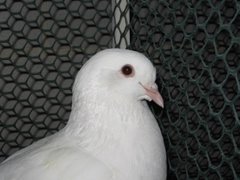
Bird 51
Gender: Male
Birth date: Unknown (from the older group)
Preferred Partner: Sweetie (Bird 59) or more recently, Bird 53. He and Bird 53 spent a lot of time together in Dr. Hesse's son's science class.
Bird 51 quickly assumed the role of "leader of the pack" when the birds were let loose in their home cage room in January 2007. All of the birds chose territory and defended it from intruders. Bird 51 and Sweetie chose the highest perch in the room and never lost control of it.
He is one of the larger birds in the flock and has a very impressive display with his short neck feathers when he is about to mate. The birds will mate with each other's partners or other singles, but then return to the company of their preferred partner. I have seen Bird 51 mate with at least three other birds besides Sweetie, but he always spends his time with her and will only protect her.
As Bird 51 is from the older group, he has been involved in many projects over the years for both the PSYC 4725 class and master's theses. One student who shaped him for class shared her story.
"We had the toughest time trying to name him. He was so funny!! He was really easy to shape- I mean he would do everything we tried to have him do but he would not do it without grunting!! It was the funniest thing! So we finally decided on the name PIA to stand for "pain in the ass" LOL :)"
Traditionally, each pair of students each year has been able to rename their birds. Only one name, according to Dr. Hesse, has lasted and that is Gimpy's (Bird 40's).
 On the right, Bird 51 is eating out of my hand. All of the birds (except the babies) will do it, and some of them will do it even when they are free-feeding - for instance, Birds 37, 49, and Sweetie (Bird 59) have all voluntarily eaten from my hand when they had free access to other sources of food.
On the right, Bird 51 is eating out of my hand. All of the birds (except the babies) will do it, and some of them will do it even when they are free-feeding - for instance, Birds 37, 49, and Sweetie (Bird 59) have all voluntarily eaten from my hand when they had free access to other sources of food.Pigeons in the wild eat seeds, but our pigeons eat a formulated pellet. Otherwise we would have to provide them with sand to grind the seed in their crop. Dr. Potter has researched the most appropriate balance of nutrients for our birds' needs and has selected a low protein pellet (birds need more protein if they are more active). Occasionally the specific pellet formula he selected is not available and a very similar one is bought. If this happens you may see changes in your bird's droppings, but they will return to normal within a few days.
(Note: if you see drastic changes in your bird's droppings and the food has not been changed or if the bird looses more than 30 grams in one day, please contact Dr. Hesse as your bird may be sick. Our birds have a lot of protection from outside germs, but they can still get sick. And they are very good at hiding their illness. I have some experience with one type of bacterial infection. The symptoms were - from most noticeable to least - diarrhea (uncommon for birds), excessive fluffing of feathers (to stay warm), and decreased activity/lethargy. If your bird has these, please let Dr. Hesse know as this bacterial infection is curable, but may lead to death if not treated. BTW - this applies to all birds, not Bird 51 specifically.)
 And finally, here are examples of Bird 51's feathers growing in after having been trimmed for a project in Dr. Hesse's son's first grade science class.
And finally, here are examples of Bird 51's feathers growing in after having been trimmed for a project in Dr. Hesse's son's first grade science class.
He won't be able to fly up to that high perch again until they all come back!
Talk about an awkward phase as your hair grows out... Here he has one full tail feather over an inch longer than the trimmed ones!

No comments:
Post a Comment